A healthy balanced diet is important for our health at any stage of life, but it’s especially important to eat well during your pregnancy. This is to ensure that both you and your developing baby get the energy and nutrients that you need.
The good news is, you don’t need to follow a special diet during your pregnancy. The advice is to follow the same dietary guidelines as normal, while being mindful that there are some foods that you’ll need to avoid and limit. And remember, no matter how far along you are in your pregnancy, it’s never too late to make healthy changes to your diet!
What should my food routine look like?
Everyone’s food routine will be slightly different, and what works for one person, might not work for another. The key thing is to eat regularly, avoid long periods without eating and to stay well hydrated by drinking plenty of fluids throughout the day.
Some women like to have 3 main meals a-day: breakfast, lunch and tea, along with 2-3 nutritious snacks a-day. While other women might prefer to eat one or two larger meals, and have several snacks in the day.
There really is no right or wrong, simply find what suits you best!
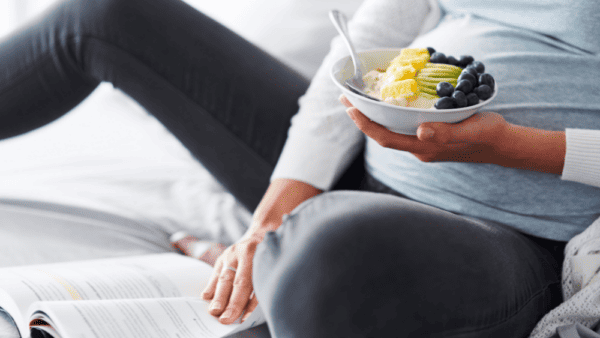
What does a Healthy Balanced Diet Look Like?
Regardless of what your food routine looks like, it’s important to consider the variety of foods that you include overall in your diet. The UK EatWell Guide (opens in new tab) is a fantastic tool to help us do this!
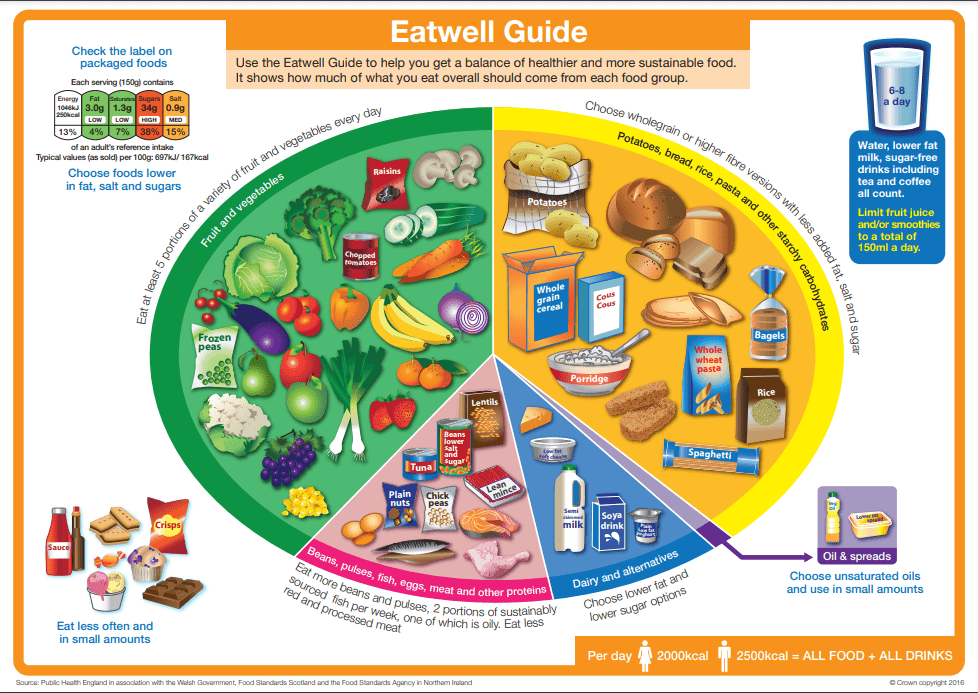
Let’s take a look at each food group in more detail and explore tips on how to include them in your diet:
Starchy foods:
- Includes foods such as: bread, potatoes, pasta, rice, polenta and breakfast cereals
- Should make up just over a third of the food you eat
- They’re an important sources of energy and fibre.
Starchy meal and snack ideas
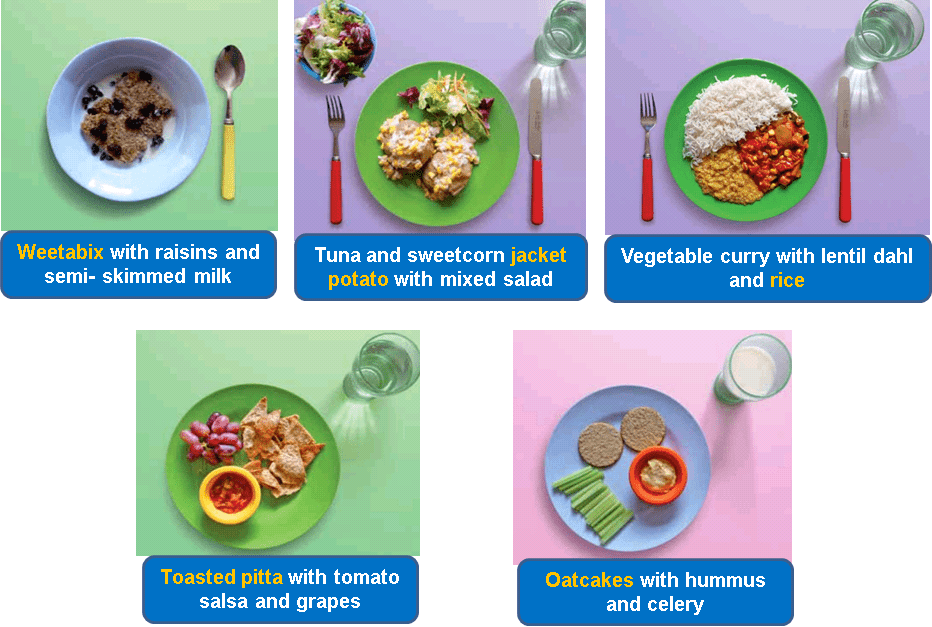
Our top tips:
- Where you can, choose wholegrain varieties, and eat potatoes with their skin on for more fibre.
- Some breakfast cereals are fortified with nutrients, such as iron, folic acid and other vitamins and minerals, which make them great choices. But try to limit those that are high in sugar e.g. those that are sugar or chocolate coated.
- Potatoes are a useful starchy food as they’re cheap, locally produced, contain a range of beneficial nutrients and are really versatile.
- Many bread based products are suitable for home freezing, so they’re great items to stock up on for useful go-to snacks.
Fruits and vegetables:
- Includes foods such as: broccoli, mushrooms, peppers, mango, banana and peach
- Try to eat at least 5 portions of fruit and vegetables each day (a portion is roughly 80g)
- They’re an important source of vitamins, minerals and fibre.
Fruit and vegetables meal and snack ideas
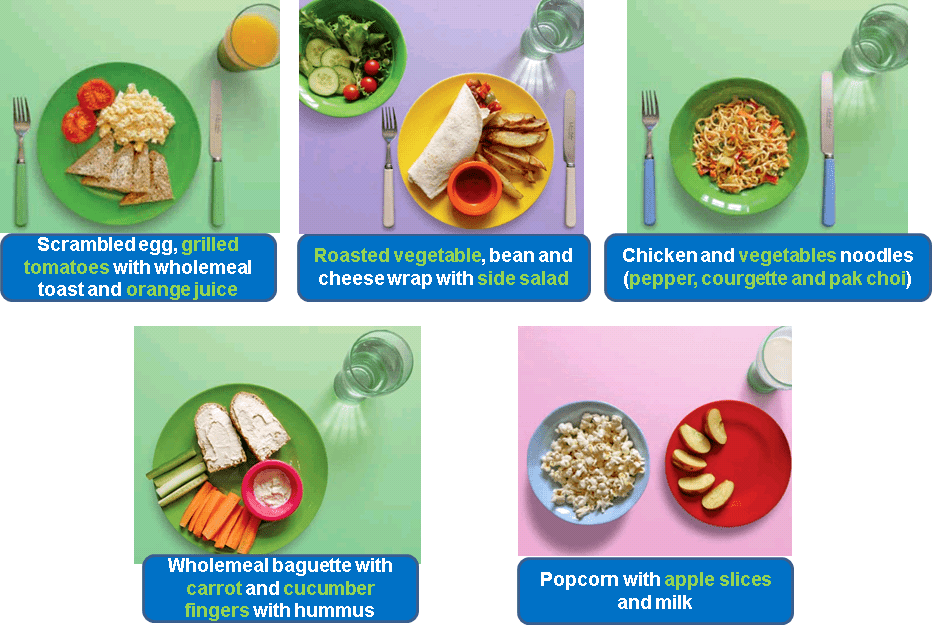
Our top tips:
- Fresh, frozen, dried and tinned fruits and vegetables all count! Just be sure to choose tinned fruit in juice rather than syrup and tinned vegetables in water, rather than brine or salted water.
- Aim for 1 or 2 portions of fruit or vegetables with each meal, and have fruit and vegetables as snacks.
- Try to include different coloured fruits and vegetables in your diet as they contain different combinations of vitamins and minerals
- Nutritious desserts and puddings are a great way of getting an extra portion of fruit into your daily diet.
Dairy and dairy alternatives
- Includes foods such as: animal milks (cows’, goats’ and sheep’s), unsweetened, calcium- fortified milk alternatives (e.g. soya, oat and almond), yoghurts (e.g. plain, Greek and soya) and cheese (e.g. cheddar, paneer and cottage cheese)
- Aim to include some dairy and/or dairy alternatives in your diet each day
- They’re a good sources of calcium, protein and iodine.
Dairy and dairy alternative meal and snack ideas:
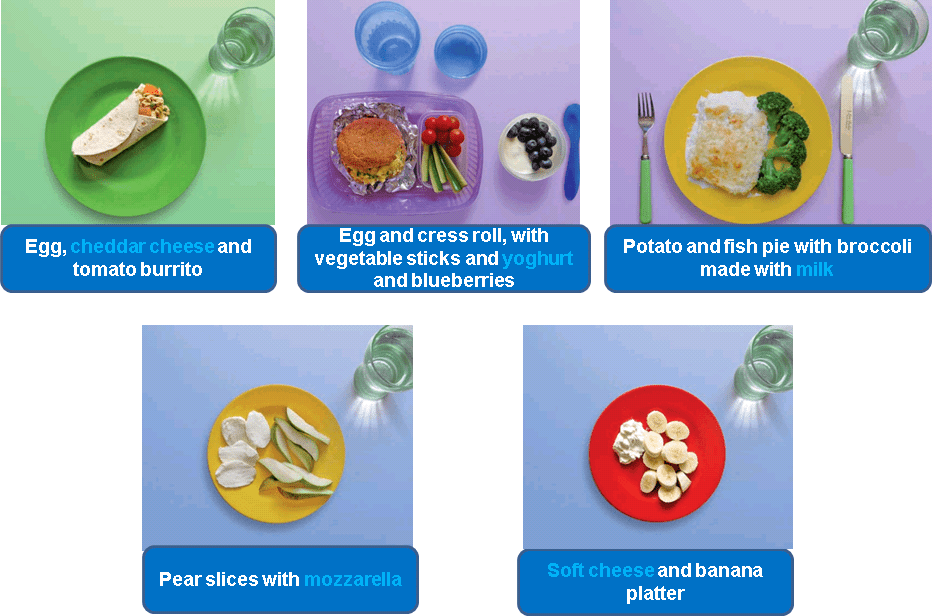
Our top tips:
- The fat content of dairy products can vary quite a lot, so to make healthier choices, try to regularly choose skimmed or 1% fat milk, and dairy products labelled as low or reduced fat, such as low-fat yoghurt and reduced-fat cheeses.
- Look for lower-salt cheeses and use smaller amounts of stronger cheeses, rather than larger amounts of milder cheese.
- You could use plain yoghurt or fromage frais instead of cream, soured cream or crème fraîche in recipes.
- Try frozen yoghurts as an alternative to ice cream.
Protein Foods
- Includes foods such as: Beans, lentils, pulses, egg, fish, meat and nuts
- Try to include some protein foods in your diet each day
- They’re a good sources of protein, iron and zinc.
Protein meal and snack ideas:

Our tips:
- Eggs and canned pulses, such as chickpeas and red kidney beans, or easy-to-use dried pulses such as lentils, are cheap alternatives to meat and fish.
- Buy good-quality meat and use smaller amounts.
- Use more vegetables, pulses and starchy foods to make meals go further, and to add more texture and flavour.
- Aim to eat two portions of sustainably sourced fish each week, and try to ensure that one of these is an oily fish (such as salmon, mackerel, sardines), as they’re a good sources of omega 3 fatty acids (but ensure you don’t eat more than 2 portions of oily fish a week).
- Tinned fish provides useful nutrients and can be more cost-effective than fresh fish, as can frozen fish. Choose tinned fish in spring water and not brine (salted water).
How to eat well during your pregnancy: A note on vegan diets:
- While following a vegan can be a healthy choice in pregnancy, it’s important to eat a varied and balanced diet to ensure you get enough nutrients.
- It’s also a good idea to include fortified foods in your diet. For example, unsweetened and calcium fortified soya milk or other plant milk alternatives and cereals.
- As sources of iodine and vitamin B12 are limited for vegans, you’ll likely need to take a daily supplement, so speak to your midwife or other health care professional for more information. You can also find additional information on the NHS website (opens in new tab) and the Vegan Society website (opens in new tab).
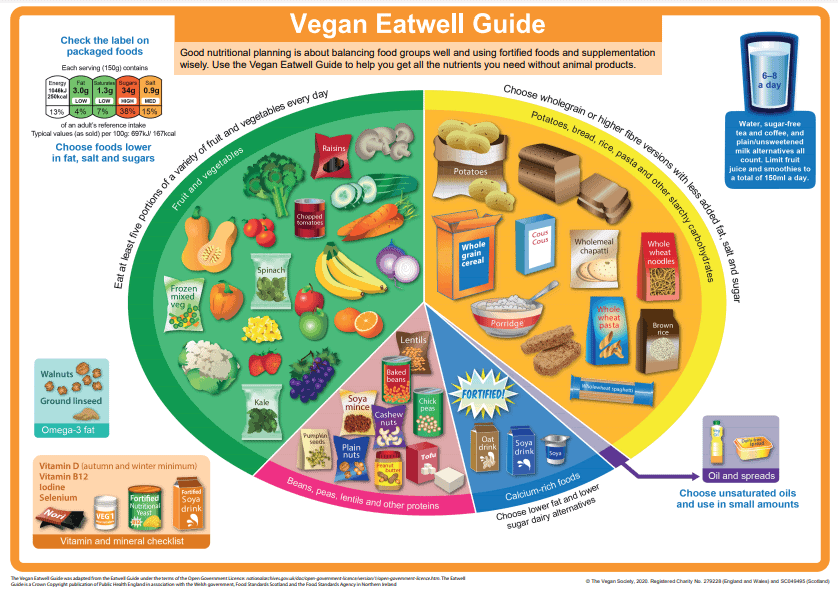
Hydration
- It’s important that you stay well hydrated by drinking regularly. Not only will this support you to feel well during pregnancy, but it can also help with common pregnancy problems, such as constipation and tiredness.
- To help you stay well hydrated, aim to have around 6 to 8 medium (200ml) glasses of water or fluid a day (1.6 litres).
- Water, lower fat milk and sugar-free drinks all count, as do fruit juices and smoothies, but as they’re high in free sugars you should try to limit your intake to 150ml per day.
- If you’re out and about, it’s a good idea to carry a water bottle with you, to ensure you can continue to have sips of water.
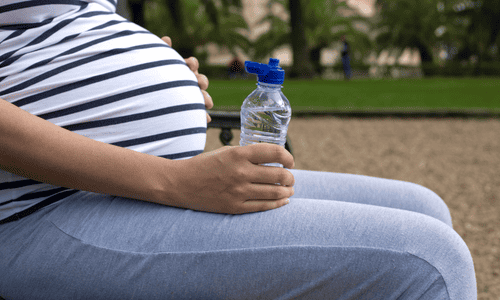
Are there any foods I need to avoid or limit during my pregnancy?
Yes. While it’s important to eat a range of nutritious foods throughout your pregnancy, there are some foods that you’re advised to limit and some that you need to avoid.
Check out our blog ‘Foods to Avoid in Pregnancy’ (opens in new tab) for more information.
Do I need to take any supplements during my pregnancy?
Yes. While you’ll get most of the vitamins and minerals you need by eating a healthy, balanced diet, when you’re pregnant you also need to take a folic acid and vitamin D supplement.
Check out our blog ‘Supplement Recommendations in Pregnancy’ (opens in new tab), for more information.
Eating Well During Pregnancy Online Course
You can also find additional information on how to eat well during your pregnancy, by signing up to our FREE online course here (opens in new tab).
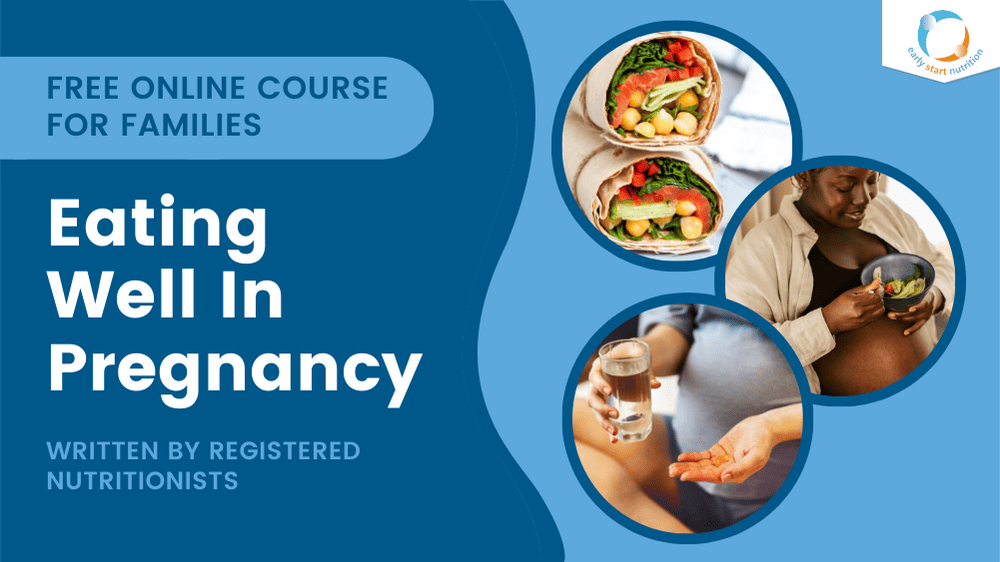
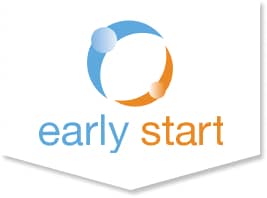
Feeding your baby the right foods during pregnancy is crucial for healthy brain development.